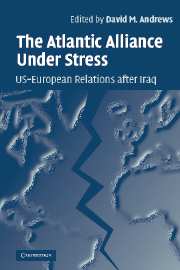Book contents
- Frontmatter
- Contents
- List of contributors
- Preface
- Introduction
- I The Iraq War and the Atlantic alliance
- II National policies within the Alliance
- III Prospects for the Alliance
- 9 The Iraq crisis and the future of the Western alliance
- 10 Military competence versus policy loyalty: central Europe and transatlantic relations
- 11 Is Atlanticism dead?
- References
- Index
11 - Is Atlanticism dead?
Published online by Cambridge University Press: 22 September 2009
- Frontmatter
- Contents
- List of contributors
- Preface
- Introduction
- I The Iraq War and the Atlantic alliance
- II National policies within the Alliance
- III Prospects for the Alliance
- 9 The Iraq crisis and the future of the Western alliance
- 10 Military competence versus policy loyalty: central Europe and transatlantic relations
- 11 Is Atlanticism dead?
- References
- Index
Summary
Can the political institutions that once formed the backbone of the anti-Soviet alliance long endure after the fall of the common enemy? Did the crisis of 2002–3 portend the demise of the Atlantic partnership? If so, what are the likely consequences? Wrestling with these questions, the contributors to this volume arrive at a range of conclusions. Some common themes emerge, however.
Regardless of where blame lies for the recent debacle – and the contributors differ sharply on that question – there is a shared sense that the project of building and maintaining an Atlantic community is at serious risk. As outlined in the introduction to this volume, the Alliance's strategic purpose is unclear and its domestic support greatly weakened in a number of key countries. The simultaneous fading of strategic clarity and erosion of domestic support is no accident. Only a rearticulation of the partnership's central meaning, in terms that correspond more closely to the desires of citizens and of organized interests on both sides of the Atlantic, will suffice if the Alliance is to thrive in the new century.
But, while the Atlantic mood has improved, it is hardly clear that national leaders will choose to revitalize the Alliance. The combination of tangible challenges and diffuse benefits poses a substantial deterrent.
- Type
- Chapter
- Information
- The Atlantic Alliance Under StressUS-European Relations after Iraq, pp. 256 - 266Publisher: Cambridge University PressPrint publication year: 2005

